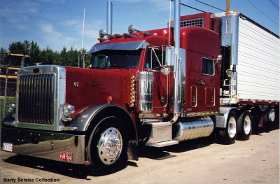Looking Investigating A Career How Do You Decide Between Dry And Refrigerated I Dont Want Flat Or Tanker I Know That Much
Topic 1908 | Page 1

Well how do you make a good decision on between going for a company with dry freight or refrigerated? I dont think I want to do flat bed or tanker so that sort of leaves these two. Also are there larger companies that run the lower half only of the country? Also thanks for the great answers you have delivered in this forum already for a new person looking into a late career change.
Ron
Brett has a chapter or two dedicated to explaining the ups and downs of the different freights. Or you could say the pros and cons. After reading that, my former choice of reefer went down on my list because I don't want anything to do with union lumpers. As a matter of fact, I would probably fo flat bed before I would go reefer. What's at the top of my choice of freight? I will either go tanker or dry van. Tanker sound intriguing to me. A con that a lot of drivers don't like is the PPE you have to wear. Well the PPE does not bother me as I was in MOPP 3 for the entire Gulf War (over 100 hours). So having to don that to load and unload is not a detractor for me. For others, perhaps. But it will not bother me. The sloshing around of whatever cargo is in the tank sound like a challenge for me. Pros for a tanker is that they are more low-profile than a dry van which give a little more leeway of going under bridges. So you will just have to read up on the different freights and weigh the differences and see what suits you. I hear you can get more chicken lights on a dry van than a tanker though. 
Dry Van:
A trailer or truck that that requires no special attention, such as refrigeration, that hauls regular palletted, boxed, or floor-loaded freight. The most common type of trailer in trucking.Reefer:
A refrigerated trailer.
When I was deciding I looked at the learning curve of each type of freight. Being brand new to this I didn't want to spread myself too thin and end up messing up everything. That was just my own thought process. I went dry van because it has the smallest learning curve. With Roehl I can switch between divisions anytime, so that helped me to decide. Best of luck with your decisions.
Dry Van:
A trailer or truck that that requires no special attention, such as refrigeration, that hauls regular palletted, boxed, or floor-loaded freight. The most common type of trailer in trucking.
Dry van can't have slower turn over on cargo but that depends on the company you work for. Refrigerated is always moving but you (generally) have tighter locations to squeeze into. Also, you get to sleep with a refrigerator strapped to your back all night long that likes to turn off and on whenever it bloody well feels like. As far as learning curve, there isn't much. Both styles will have companies that want clean trailers while others don't seem to care.
Refrigeration training (for me) was basically listed as such: how to turn it on, how to change the temperature, how to pre-trip the unit, look for leaks or holes in the trailer where air can escape and where to fill up with diesel. It's pretty much that simple.
Dry van was much quieter and easier to deal with. I would say go dry as long as you get enough freight. Refrigerated is just more hassle that you wont' get paid extra for. I'm sure I sound cynical about it but that's just my experience after a year of refrigerated and a shorter time at dry.
Dry Van:
A trailer or truck that that requires no special attention, such as refrigeration, that hauls regular palletted, boxed, or floor-loaded freight. The most common type of trailer in trucking.
Dry van can't have slower turn over on cargo
Dry van CAN have slower turn over on cargo. Sorry, I can't seem to edit my previous post.
Dry Van:
A trailer or truck that that requires no special attention, such as refrigeration, that hauls regular palletted, boxed, or floor-loaded freight. The most common type of trailer in trucking.Indeed you can read through my book Becoming A Truck Driver: The Raw Truth About Truck Driving where I talk about that stuff quite a bit. That link is to the 100% free online version of the book by the way.
We also have a series of articles on How To Choose A Trucking Company, including an 8 part article series I wrote which covers the different types of freight and the differences between them.
Either of those sources will give you a lot of insights into the differences between the various types of freight.
To give a quick summary though:
1) Refrigerated carriers tend to average longer runs than dry van.
2) Refrigerated carriers rarely have the option of getting you home more often. They tend to be over the road jobs where dry van offers more regional and dedicated runs that can get you more often - like on weekends.
3) The amount of freight fluctuates more with dry van than with refrigerated. Dry van will see bigger spikes leading up to the holidays and then a big drop off afterward. Refrigerated carriers stay more steady throughout the year because they're hauling a lot of food.
Those are some quick differences off the top of my head.
Dedicated Run:
A driver or carrier who transports cargo between regular, prescribed routes. Normally it means a driver will be dedicated to working for one particular customer like Walmart or Home Depot and they will only haul freight for that customer. You'll often hear drivers say something like, "I'm on the Walmart dedicated account."
Regional:
Regional Route
Usually refers to a driver hauling freight within one particular region of the country. You might be in the "Southeast Regional Division" or "Midwest Regional". Regional route drivers often get home on the weekends which is one of the main appeals for this type of route.
Over The Road:
Over The Road
OTR driving normally means you'll be hauling freight to various customers throughout your company's hauling region. It often entails being gone from home for two to three weeks at a time.
Dry Van:
A trailer or truck that that requires no special attention, such as refrigeration, that hauls regular palletted, boxed, or floor-loaded freight. The most common type of trailer in trucking.HOS:
Hours Of Service
HOS refers to the logbook hours of service regulations.OOS:
When a violation by either a driver or company is confirmed, an out-of-service order removes either the driver or the vehicle from the roadway until the violation is corrected.
New Reply:
New! Check out our help videos for a better understanding of our forum features

















Preview:








 TT On Facebook
TT On Facebook
Well how do you make a good decision on between going for a company with dry freight or refrigerated? I dont think I want to do flat bed or tanker so that sort of leaves these two. Also are there larger companies that run the lower half only of the country? Also thanks for the great answers you have delivered in this forum already for a new person looking into a late career change.
Ron